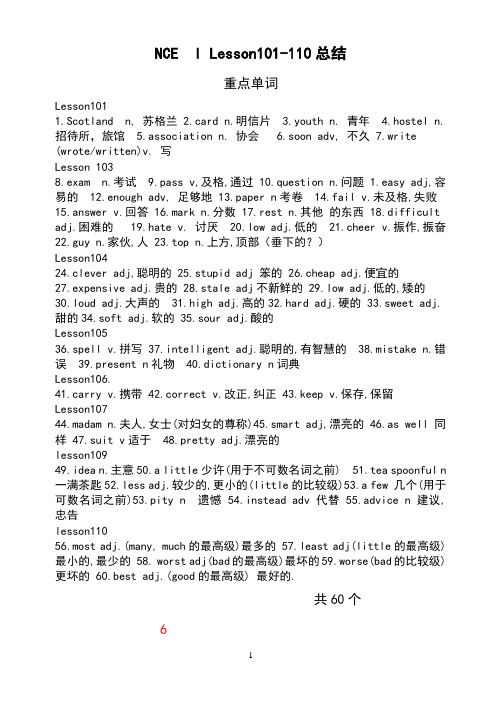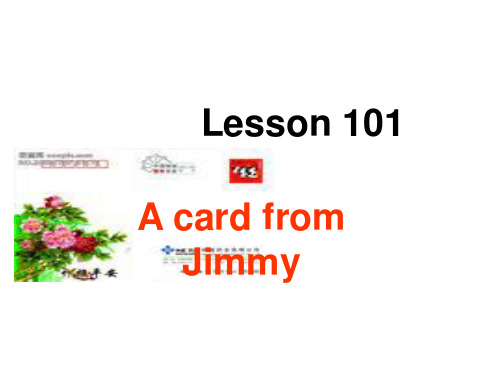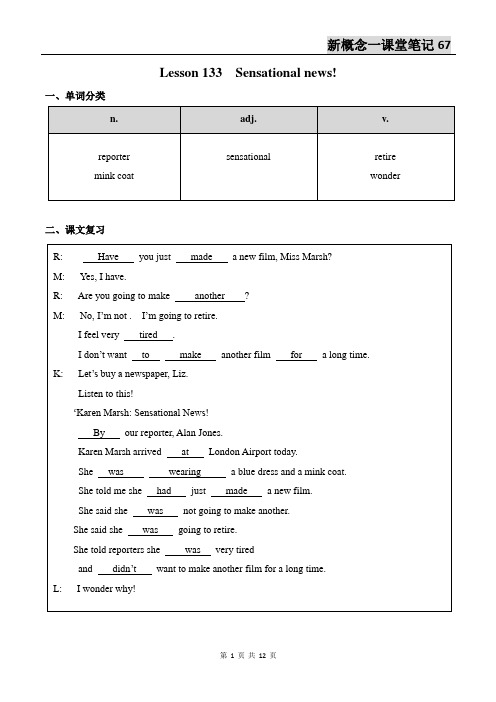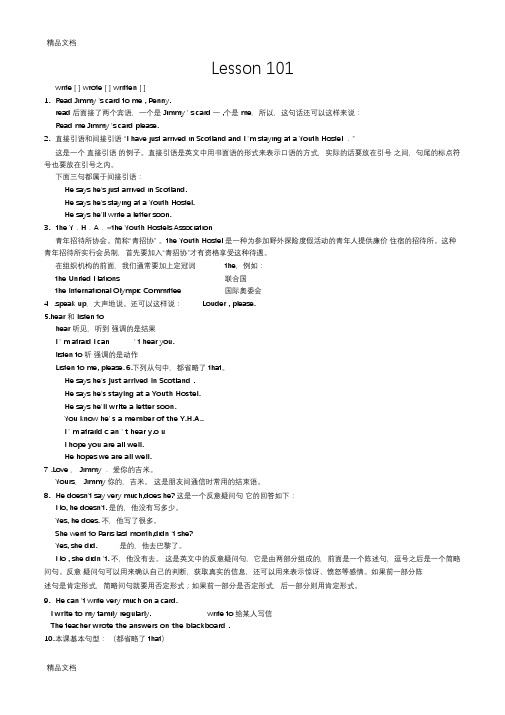新概念语法之直接间接引语
新概念101--110短语总结

NCE I Lesson101-110总结重点单词Lesson1011.Scotland n, 苏格兰2.card n.明信片3.youth n. 青年4.hostel n. 招待所,旅馆5.association n. 协会6.soon adv, 不久7.write (wrote/written)v. 写Lesson 1038.exam n.考试 9.pass v,及格,通过 10.question n.问题 1.easy adj,容易的 12.enough adv, 足够地 13.paper n考卷 14.fail v.未及格,失败15.answer v.回答 16.mark n.分数 17.rest n.其他的东西 18.difficult adj.困难的 19.hate v. 讨厌 20.low adj.低的 21.cheer v.振作,振奋22.guy n.家伙,人 23.top n.上方,顶部(垂下的?)Lesson10424.clever adj,聪明的 25.stupid adj 笨的 26.cheap adj.便宜的27.expensive adj.贵的 28.stale adj不新鲜的 29.low adj.低的,矮的30.loud adj.大声的 31.high adj.高的32.hard adj.硬的 33.sweet adj.甜的34.soft adj.软的 35.sour adj.酸的Lesson10536.spell v.拼写 37.intelligent adj.聪明的,有智慧的 38.mistake n.错误 39.present n礼物 40.dictionary n词典Lesson106.41.carry v.携带 42.correct v.改正,纠正 43.keep v.保存,保留Lesson10744.madam n.夫人,女士(对妇女的尊称)45.smart adj,漂亮的 46.as well 同样 47.suit v适于 48.pretty adj.漂亮的lesson10949.idea n.主意50.a little少许(用于不可数名词之前) 51.tea spoonful n 一满茶匙52.less adj.较少的,更小的(little的比较级)53.a few 几个(用于可数名词之前)53.pity n 遗憾 54.instead adv 代替 55.advice n 建议,忠告lesson11056.most adj.(many, much的最高级)最多的 57.least adj(little的最高级)最小的,最少的 58. worst adj(bad的最高级)最坏的59.worse(bad的比较级)更坏的 60.best adj.(good的最高级) 最好的.共60个6重点短语1.a card from Jimmy Jimmy寄来的明信片2.read sth. tosb .(read sb sth) 给某人读3.Youth Hostel(Association) 青年招待所4 .arrive in... 到达,大地点5.stay at ... 呆在...6.a member of... ...中的一名成员7.what else 其他的什么8.write a letter写封信9.write a letter to sb 给某人写信10.speak up 大声说11.hear sb 听见...说话12.hear from sb 收到某人的来信13. hear of... 听说... 14.write very much写很多15.sooner or later 迟早16.the French test 法语考试17.pass in...(科目) ...及格18.pass the exam (考试,考试卷) ...及格19.fail in the exam (科目) ...不及格20.fail... (考试,考试卷) ...不及格21.the English papers 英语考试卷22.easy enough for me to do sth . 对我来讲够容易23.enough time 足够的时间24.the rest 其余的25.too difficult for me to do sth 对我来讲太难26.have a low mark 得了个低分27.have a high mark 得了高分28.have full marks 得满分29.cheer up 振作起来30.nextto me 挨着我31.at the top of... ...的顶端32.at the bottom of... 的底部33.sit there 坐在那34.the answer to... 的答案35.too...to... 太..而不能... 36...enough...to do 够...能做... 37.How (What)about...? ...呢?38.clever enough 够聪明39.too stupid 太笨了40.cheap enough 够便宜41.too expensive 太贵了42.a fresh hand 新手43.fresh air 新鲜的空气fresh water 淡水44.stale food 馊了的食物45.in a low voice 用低的声音46.a low house 一座低矮的房子47.a high price 高价48.a hard stone 一块坚硬的石头49.work hard 努力工作50.sweet orange 甜橙51.sweet shops 糖果店52.soft enough 够软53.a soft voice 柔和的声音54.too sour 太酸55.want to so... 想做... 56.want sb.to do sth.想让某人做某事57.speak to sb. 同...讲话58.want her to come to my office 想让她来我办公室59.tell sb.to do...告诉..做... 60.tell her to come 告诉她来61.at once 马上62.be full of mistakes 满是错误63.be full of... 充满....64.make a mistake 犯错误65.a little present 一个小礼物66.type it again 再打一遍67.at present 目前68.anEnglish-Chinese dictionary一本英汉词典69.I'm sorry about... 对...很抱歉70.be sorryto do sth 对..很抱歉71.be sorry that 对...抱歉72.keep the piano in my room 把钢琴存放在我的房间里73.a correct answer 一个正确的答案74.correct exercise books 批改练习本75.carry an umbrella 带着把伞76.a lovely dress 一件漂亮可爱的裙子77.too small for me 对我来讲太小78.this one 这一个79.short skirts 短裙79.be in fashion 流行80.be out of fashion 过时81.all right 好吧82.would like to do sth 愿意做某事83.as well同样,也84.suit me 适合我85.not...at all 根本不86.like that one像那个一样87.like...very much 非常喜欢88.I'm afraid... 我恐怕89.the blue one 蓝色的那一个90.show me 给我看91.another blue dress 另一条蓝裙子92.a larger dress 一条大一点的裙子93.in the shop 在商店里94.a good idea 一个好主意95.just a little 就一点( 不可数名词) 96.a few 几个(可数名词)97.less then... 比...少/少于...98. more then... 比...多;多于...99.one and a half teaspoonful 一茶匙半100.some more更多的101.of course 当然102.have a biscuit 吃块饼干103.It doesn’t matter 没关系104.eat more 多吃点105.smoke less 少抽点106.good advice 好忠告107.instead of... 而不是...代替... 108.make (some) coffee 煮咖啡109. be enough for... 对...来讲足够共109个重点语法总结1.直接引语和间接引语(一)直接引语就是直接引用说话人原来所说的话,间接引语就是用自己的话转述原来说话人所说的话。
新概念英语第一册语法点梳理

新概念英语第一册语法点梳理新概念一共144课,其中单课为课文,双课为语法和练。
整本书是以单数课为正课,并附带有插图而双数课则是针对单数课所讲的内容有针对性地进行练,从此出展现出整个新概念一教材区别于其他教材的独特之处。
以下是对新概念一整本教材的理解和剖析,以供各位对整个课本的理解和把握上参考和借鉴。
首先根据课本中出现的时态来分析:本册书的语法出现层次性和规律性是很强的,首先我们先来整本书中都出了哪些时态,这些时态的具体分布和讲解时我们大家需要注意的递进性。
Lesson 31—34现在进行时Lesson 37—40第一次出现be going to的将来时Lesson 51—56一般现在时Lesson 67—76为一般过去式Lesson 83—90为现在完成时Lesson 91—96为一般将来时(will)Lesson 117—118过去举行时Lesson 119—120过去完成时撤除前面一切时态和句型所占领的76课我们一同来看一下以下的68课,每课小的言语点,语法点都是在什么地方,应当用什么样的体式格局来说授。
新概念一的每个单课的重点都是出现双课的题目和课后的操演题内里。
Lesson1—2语言点:与陌生人说话或引起别人的注意。
Excuse me. Yes? Pardon? Thank you very much.语法点:主系表结构this为主语,名词做表语1的一般疑问句以及它的肯定回答。
Is this your handbag?Yes, it is.Lesson 5—6言语点:若何引见别人。
This is Miss Sophie Dupont. Nice to meet you.语法点:主语为第三人称单数的主系表结构。
She is French. He is German. It’s a Volvo.(L6)a/an的利用。
Lesson 7—8语言点:如何自我介绍和相互认识。
语法点:主语为第二人称的主系表结构。
(推荐)Lesson133直引变间引新概念一

• Let’s buy a newspaper, Liz. • Let’s buy= Let us buy. • Let’s go swimming!
• Listen to this! • listen to 听,表听的动作 • listen不及物动词,接宾语时必须加介词,构
成及物动词短语。 • 听,这是什么声音?你能听到吗? • Listen! What's that noise? Can you hear it?
• 'Karen Marsh: Sensational News! • By our reporter, Alan Jones. • by表示动作的执行者,意为“由….”或“被…” • 培根写的一本书 a book by Bacon
• Karen Marsh arrived at London Airport today. • arrive at 到达,到达一个较小的地方 • arrive in 到达,到达一个较大的地方 I arrived in England on Friday. We first arrived at
• What are they doing? make a film
reporter n.
-er 后缀,表示人
-or, -ess(女) , -ee,
learner 学习者 doctor 医生 actress 女演员
teacher 教师
driver 司机
artist 艺术家 dentist 牙医
waitress 女服务员 visitor参观者
• dress “给…穿衣”,对象是人,而非衣物 • She dressed her baby first, and then dressed
(推荐)新概念第一册101课-直接引语与间接引语1和反义疑问句概要

read sth to sb 读给某人听 read sth for sb 替某人读
P: He says he's just arrived in Scotland. He says he's staying at a Youth Hostel. You know he's a member of the Y.H.A.
card
n. 明信片
youth
n. 青年
hostel
n. 招待所,旅馆
association
n. 协会
sritten) v. 写
• 明信片的由来 :
• 1865年,德国有一位画家(名字未 考证)在一张硬纸上画了一幅画, 同时写上几句问候的话,打算寄给 他的朋友,但找不到有这多大的信 封来装寄,后来在邮局职员的建议 下,这画上图案的硬纸背后上,写 上朋友的地址和姓名寄出,这就是 明信片的鼻祖。
该国的青年人 一 般都有礼貌
The youth of the nation is polite in general. 2)青年(少年)时期,青春时期 他少年时代在美国度过
He spent his youth in the U.S.A 他年轻时学过意大利语。
He studied Italian in his youth. 3)青春
你报告写好了没有? 用英文写
write in English Write to sb. 给某人写信 我一个月给我家人写两封信。 I write to my family twice a month.
G: Read Jimmy's card to me please, penny.
P: 'I have just arrived in Scotland and I'm staying at a Youth Hostel.'
新概念一101课Lesson101-直接-间接引语

• 10.He won’t come tonight. I think.(同上) • I _don’t_ think _that_ he _will__come tonight. • 11.He can’t write very much on a card,_can_ _he_?(反意疑问句) • 12.Read this part to me .(同义句) • Read _me_ this _part__.
• 4.He says he’ll write a letter soon. • “____ ___ write a letter soon.” he says. • 5.I have just arrived in Scotland.” Jimmy says to his mother . • Jimmy ___his mother that he ___ just ___in Scotland. • 6. “When did the train leave?” Jason asks the porter. • Jason asks the porter ___the train ___.
17.Steven says he is_ ill now.(feel) 18.Mr.williams says that he will_his old house next week.(sell) 19.She knows that she must _for the bus at the bus stop.(wait) 20.Dose he believe that he can_his work at once(finish) 21.This little child says she_very tired now.(be) 22.The teacher says that Tom always__hard.(work) 23.I am sure that my sister have _ the cheese(eat)
新概念第二册语法总结

新概念英语二册语法总结(新东方张燕老师)1.简单句的结构:主语+谓语+宾语+状语(地点状语+方式状语+时间状语)时间状语还可以放在句首2.一般现在时,现在进行时感叹句:what+名词+主语+谓语,how+形容词/副词+主语+谓语频度副词:位于主语和谓语之间,常见频度副词及其程度的深浅:always, often, usually, frequently, sometimes, hardly, rarely, seldom, neverI always buy CDs on Sundays.3.一般过去时直接宾语和间接宾语:主语+及物动词+间接宾语+直接宾语直接宾语是及物动词的直接对象,间接宾语是及物动词的动作所涉及的人或事务,也可以说间接宾语表示动作是对谁做的,或者是为谁做的。
所以间接宾语要用名词或者宾格代词来担当。
He gives me a book.me间接宾语, a book直接宾语直接宾语和间接宾语的位置调换时要加一个介词to或for,to表示动作对谁而做,for表示动作为谁而做。
主语+及物动词+直接宾语+介词+间接宾语Give the book to me.Send a letter to him.I bought a coat for my mother.4.现在完成时,注意频度及时间副词的位置receive/take5.复习:一般过去时与现在完成时的区别in the way/on the way/in this way/by the way/in a way/get out of my way/Don’t stand in my way./by the way/no wayspare/to spare6.冠词用法(一)1.不定冠词用于修饰单数可数名词,当一个单词的第一个发音为元音时要用冠词an, 如果是辅音用a即可。
2.不定冠词还可以用来修饰一类事物,有时候也可以省略:A cat is a lovely animal. Cat is a lovely animal.3.不可数名词加冠词表示一类事物:Apple is a fruit.4.如果特制某人,某物或上文提过的人或物时要用定冠词the5.Some表示一些,可以修饰可数名词及不可数名词。
新概念英语第一册:101-102课 语法及单词解析

新概念英语第一册:101-102课语法及单词解析【篇一】语法 Grammar in use直接引语和间接引语直接引语就是直接引用说话人原来所说的话;间接引语就是原话的转述。
直接引语放在引号里,间接引语是把说话人的原话变成宾语从句。
间接引语中,宾语从句中的动词与主句中的主要动词在时态上必须保持一致。
一般来说,主要动词用现在时,间接引语中可用现在时(包括一般现在时、现在实行时、现在完成时)和将来时。
如:She says shes got a headache.她说她头痛。
He says hes staying at a Youth Hostel.你说他正住在一家青年招待所。
He says he has sold his house.他说他已卖掉了房子。
把直接陈述改为间接引语时,谓语动词形式的变化体现在人称上。
如:He says:‘I hope you are all well. ’他说:"我希望你们都身体健康。
"He says he hopes we/they are all well.他说他希望我们/他们都身体健康。
The girl says:‘I have finished my homework.’那个姑娘说:"她已完成了家庭作业。
"The girl says that she has finished her homework.那个姑娘说她已完成了家庭作业。
【篇二】词汇学习 Word studywrite v.(1)写,书写:They are learning to read and write.他们在学习读书写字。
She writes legibly.她笔迹清楚。
(2)写信:Ill write to you soon.我会尽快给你写信的。
Why didnt she write and tell him?她为什么不写信告诉他?(3)写作;作曲;当作家:He started to write for the stage.他开始成为一名剧作家。
新概念语法之直接间接引语

Examples:
“How can I get to the station?” Could you tell me?
Could you tell me how I can get to the station.
“Why is the train late?” Would you tell me?
Would you tell me why the train is late.
Summery: 变化规则要注意,时态要注意,去掉 引号和问号要注意!
• 1.“I never eat meat.” he said. He said that ______ never ______ meat.
• 2. “I have found my wallet.” he said to me. He ______ me that he ______ ______ ______ wallet.
evening?” 7. “Don’t tell him the news.” she said. 8. She said “where does Peter live?” 9. She said to me “Is there any water there?’’ 10. His father said to him, "Don’t leave the door
选择疑问句:
用whether…or连用
She asked “will you do your homework or watch TV?”
--She asked Johnson whether he would do his homework or watch TV
Examples:
“Come in ,please!” he said. --He told me to come in.
新概念英语第一册Lesson133-134笔记(语法点+配套练习+答案)

Don’t speak aloud. Hehasjustslept(sleep).
Imet(meet) an old friend in the street just now.
I feel very tired.我感觉很累。
feel,系动词,后跟形容词
Turn on the air-conditionerimmediately .
我们庆祝爷爷退休。
reporter n.记着
report v.报道
It is reported that ...据报道
John is anews reporter.John是个新闻记者。
It isreported(reported, reporting)that the thief was caught two hours ago.
Lesson 133 Sensational news!
1、单词分类
n.
adj.
v.
reporter
mink coat
sensational
retire
wonder
2、课文复习
3、课文重点
重点
练习
retire v.退休
retire from ...从...退休
n.retirement来自构词法:v.+ ment = n.
听,这是什么声音?你能听到吗?
Yousoundterrible. Do you have a sore throat?
by sb.被,由
a book writtenbyBacon培根写的一本书
The boywas hitbya ball.男孩被球打。
The news is reportedbyhim.新闻被他报道。
新概念英语第一册97112课语法点总结

新概念英语第一册97-112课语法点总结一. 代词1. 物主代词(译为“谁的”)● 注意:形容词性物主代词具有依赖性,其后必须紧跟一个名词。
● 注意:名词性物主代词 = 形容词性物主代词 + 名词 例:This is my suitcase.或 This suitcase is mine. 这是我的手提箱。
2. 人称代词(译为“谁”)• 注意:人称代词的主格用于主语,即动作的发出者;人称代词的宾格用于宾语,即动作的承受者。
二.宾语从句1.定义在句子中起宾语作用的从句叫做宾语从句。
2.类型a.陈述句引导词:that;that可省略例:I think (that) it is a cock. 我认为它是一只公鸡。
b.一般疑问句引导词:if或whether,译为“是否”。
例:一般疑问句:Does he like English? 他喜欢英语吗?宾语从句:I want to know whether / if he likes English. 我想知道他是否喜欢英语。
c.特殊疑问句引导词:特殊疑问词例:特殊疑问句:Why did I die? 为什么我死了?宾语从句:Paul asked why he died. 章鱼保罗问为什么他死了。
3.使用三原则a.时态呼应b.语序正常;宾语从句使用陈述句语序。
判断标准:引导词后紧跟主语。
c.真理规律永不变三.直接引语和间接引语1.定义直接引语:直接引用别人的话间接引语:间接转述别人的话2.直接引语变间接引语口诀:人变变,动变变,句子的顺序变一变,关键词也要来变变。
四.反义疑问句1.构成反义疑问句由两部分构成,前面是一个陈述句,后面是一个简略的疑问句。
2.含义反义疑问句可以用来确定自己的判断,获取真实的信息,还可以用来表示惊讶、愤怒等感情。
3.形式如果前面的陈述句是肯定形式,后面的简略疑问句用否定形式;如果前面的陈述句是否定形式,后面的简略疑问句用肯定形式。
简称:前肯后否,前否后肯•注意:反义疑问句回答真实情况。
新概念英语第一册直接引语和间接引语试题

English Test for Lessons 102- 104 and 133-136I. Fill in the blanks with the proper words.1. He has some (difficult) in (find) his lost watch.2. The film was (wonder).3. Do you know which is the (late) film.4. She told the (report) that she felt very tired.5. To travel by air may be (expensive) than by sea.6. The book is (interest) enough for me to read. I’m really (interest) in it.7. Uncle Wang didn’t finish (repair) the TV set at that time.8. The doctor says that he will come at (one).9. He hurt (him) badly this morning. 10. The street is wet and (slip) after rain.11. No hurry. We’ve got plenty of time (wait).12. If y ou don’t hurry, you (be) late for the meeting.II. Fill in the blanks with the proper verbs.1.Hurry up, or we (miss) the train.2. Jimmy hopes (be) back soon.3. It’s the best way (work) out the problem.4. The rain (stop). Let’s start at once.5. He said that he (write) a letter soon.6. He the work in two years.7. My mother (work) in the library for twenty years.8. I think that the doctor had better (see) you.9. What you (do) when I knocked at the door?10. He said that she (hear) about it long before.III. Fill in the blanks with the proper conjunctions.1. Do you remember he said about it?2. The policeman asked him he came from.3. Could you tell me you like my daughter or not.4. I’m afraid I can’t help you.5. The teacher wants to know we can hear him clearly.6. Ann said he had been to Paris before.7. I wonder bus you take to work every day.8. Do you know I should water these flowers? Three times a month.IV. Choose the best answer.1.Can you tell me yesterday?A. what they doB. what they didC. what do they doD. what did they do2. Do you know yesterday? A. how did she come to school B. when she will come to schoolC. what didn’t she come to schoolD. why she didn’t come to school3. I hope you are all well. A. if B. whether C. that D. this4. Read Jimmy’s card me. A. for B. to C. on D. of5. –When do those shops open? --I’m not sure when .A. they openB. are they openC. they openingD. do they open6. He doesn’t say very much,he? A. can B. can’t C. does D. doesn’t7. We got to a small village and left morning. A. second B. the next C. next D. first8. –Where we wait for him? –Let’s meet him outside the school gate.A. doB. willC. areD. shall9. – When again? –When he , I’ll let you know.A. he comes, comesB. will he comes, will comeC. he comes, will comeD. will he come, comes10. Could you tell me ?A. when shall we startB. who are you waiting forC. where the bus station isD. why were you late11. They have made up their minds it well. A. do B. doing C. to do D. to doing12. She me that she was reading. A. said B. said to C. told D. told to13. Ask her come with us. A. if she will B. if will she C. whether will she D. will she14. Everyone wants to know last night.A. what was happened to himB. what happened about himC. what was happened about himD. what happened to him15. He told me that he . A. arrive B. has arrived C. arrived D. had arrived16. She told the reporters that they married .A. will get, next weekB. would get, next weekC. got, next weekD. had got, next week17. Teacher told us the light faster than the sound yesterday.A. travelB. travelsC. travelledD. travelling18. Fish can’t live water. A. with B. have no C. without D. have19. I met Ken on my way home day. A. other B. another C. the other D. the others20. Don’t anything behind. A. leave B. leaves C. left D. forgetV. Change the sentences according to the requirements.1. He finished the job in two days. (写出同义句)It him two days finish the job.2. There has been plenty of rain these days. (写出同义句) It has rained these days.3. You have already missed the train. (写出同义句) You have the train yet.4. The train will leave in five hours’ time. (就划线部分提问)5. He won’t come tonight. I think. (合并句子)6. She married John three years ago. (写出同义句) She got John three years ago. VI. Change the direct speech into the indirect speech.1. “How much does a car cost in America?” He asked Lucy.2. “May I ask you some questions?” The son asked his father.3. “Has it ever broken down?” Tom asked Penny.4. “Come to school in your old clothes tomorrow.” The teacher said to the students.5. “We lost the game to No. 1 Middle School.” Jim said.6. Tim said,” Let’s watch a film.”VII. Reading comprehensionAEvery year students in many countries learn English. Some of these students are children. Others are young people. Some students learn English at school,and others teach themselves.Why do all these people want to learn English? It is very difficult to answer this question.Many boys and girls learn English at school because it is one of their subjects. Many people learn English because it is useful in their work. Some young people learn English for their higher studies because some of their books are in English at college or university. Other people learn English because they want to read newspapers or magazines in English.1. 根据短文内容在文中空白处填上恰当的答案。
新概念英语一直接引语变间接引语

直接引语变间接引语的七点变化 ?一、时态的变化直接引语变为间接引语时,若主句为过去时态,变为间接引语的宾语从句通常要将时态往后推一个,即一般现在时变为一般过去时,一般将来时变为过去将来时,现在进行时变为过去进行时,现在完成时变为过去完成时,一般过去时也变为过去完成时,等等(若直接引语为过去完成时,变为间接引语可以不变)。
另外,若直接引语中有情态动词can, may等,也应变成过去式could, might等(情态动词must可以变为had to,也可不变,should, had better 等可以不变)。
如:“I like to watch TV,” she said. 她说:“我喜欢看电视。
”→She said that she liked to watch TV. 她说她喜欢看电视。
He said, “I’m waiting for her.”他说:“我在等她。
”→He said that he was waiting for her. 他说他在等她。
“It will rain soon,” he said. 他说:“很快就会下雨。
”→He said that it would rain soon. 他说很快就会下雨。
“She can swim,” he said. 他说:“她会游泳。
”→He said that she could swim. 他说她会游泳。
注意:(1) 若直接引语为客观真理,则变为间接引语时时态不变: The teacher said, “The earth turns around the sun.”老师说:“地球绕着太阳转。
”→The teacher said that the earth turns around the sun. 老师说地球绕着太阳转。
(2) 有时由于直接引语有特定的过去时间状语,变为间接引语时时态也可不变: He said, “ was born in 1954.”他说:“我是1954年生的。
新概念英语直接引语间接引语

1.He said“I have lost my umbrella”He said he had lost his umbrella.2.paul said “I`m trying to get a taxi”Poul said he was trying to get a taxi.3.He expained“I have eaten meat”He explained he had eaten meat.4.“Have you been have for ages?” sh e saidShe asked if/whether she had been had for ages.5.He said “I took the dictionary home with me”He said he had taken the dictionary home with him.6.Herry said “Franls , I came to return you the bush”Herry told Franls (that) he had come to return his brush.7.He asked“are you sure your mother will come”He asked if/whether I was sure my mother would come.直接引语间接引语一般现在时一般过去时现在进行时过去进行时现在完成时过去完成时一般过去时过去完成时过去完成时过去完成时(不变)一般将来时过去将来时can couldmay mightwill would----------------------------------------------------------------------注:直接引语转换成间接引语时的变化应视情况而定。
假如就在当天转述,today,yesterday,tomorrow等就不需改变;如果在当地转述,here也不必改为there,come也不必改为go。
新概念英语第一册101-110课自学笔记(很全、很好)(汇编)

Lesson 101write [ ] wrote [ ] written [ ]1.Read Jimmy 's card to me , Penny.read后面接了两个宾语,一个是Jimmy ' s card一,个是me,所以,这句话还可以这样来说:Read me Jimmy 's card please.2.直接引语和间接引语“I have just arrived in Scotland and I 'm staying at a Youth Hostel .”这是一个直接引语的例子。
直接引语是英文中用书面语的形式来表示口语的方式,实际的话要放在引号之间,句尾的标点符号也要放在引号之内。
下面三句都属于间接引语:He says he's just arrived in Scotland.He says he's staying at a Youth Hostel.He says he'll write a letter soon.3.the Y.H.A.=the Youth Hostels Association青年招待所协会。
简称“青招协” 。
the Youth Hostel 是一种为参加野外探险度假活动的青年人提供廉价住宿的招待所。
这种青年招待所实行会员制,首先要加入“青招协”才有资格享受这种待遇。
在组织机构的前面,我们通常要加上定冠词the,例如:the United Nations 联合国the International Olympic Committee 国际奥委会4.speak up,大声地说。
还可以这样说:Louder , please.5.hear 和listen tohear 听见,听到强调的是结果I ' m afraid I can ' t hear you.listen to 听强调的是动作Listen to me, please. 6.下列从句中,都省略了that。
新概念英语100课--语法专练 间接引语

新概念英语91-100 语法专练-----直接引语转间接引语一、主句是一般现在时,从句的时态一般不发生变化She says,”I am a nurse.”----She says that she is a nurse.She says,”I used to be a teacher.”----She says thatshe used to be a teacher.She says,”I miss you very much.”---She says that she misses us very much.二、主句是过去式;1.直接引语是一般现在时,间接引语变成一般过去式She said,“I am busy today.”----She said that she was busy that day.2.直接引语是现在进行时,间接引语变成过去进行时;She said, “ The students are talking happily with each other.”---She said that the students were talking happily each other.3.直接引语是现在完成时,间接引语转变成过去完成时;She said, “I have finished typing the letter.”---She said that she had finished typing the letter.4.直接引语是一般过去时,间接引语转变成过去完成时;She said, “I lost my pen three days ago.”---She said that she had lost her pen three days before.5.直接引语是一般将来时,间接引语转变成过去将来时;She said, “I will get up early tomorrow morning.”---She said that she would get up early the next morning.三、直接引语是疑问句,间接引语要转陈述语序,不再用倒装语序1.直接引语为一般疑问句,间接引语需要用whether/if引导;She asked, “ Can you swim, John?”----She asked whether John could swim.She asked me, “ Are you good at drawing?”----She asked me whether I was good at drawing.My mother asked, “ Youhave finished the homework, haven’t you?”----My mother asked me whetherI had finished thehomework.2.直接引语是某个特殊疑问词引导的特殊疑问句,间接引语仍然用这个特殊疑问词引导。
新概念第二册L15 L39直接引语和间接引语知识点总结

直接引语和间接引语一、概念直接引语是直接引述别人的话。
前后要加引号。
间接引语是用自己的话转述别人的话。
多数情况下构成宾语从句, 且不用引号。
She says, “I’ll never forget the moment.”她说: “我将永远不会忘记此刻。
”(直接引语)Sh.say.tha.she’l.neve.forge.th.moment.她说她将永远不会忘记此刻。
(间接引语)二、直接引语如何变为间接引语直接引语变为间接引语时, 多数情况下构成宾语从句或复合宾语。
(一) 句式的变化1.直接引语如果是陈述句, 变为间接引语时, 要变为用连词that引导的宾语从句(that在口语中常省略) He said, “I want to be an actor.”→ He said (that) he wanted to be an actor.The doctor said, “You should drink plenty of water.”→The doctor told me that I should drink plenty of water.2.直接引语如果是疑问句, 变为间接引语时, 要改为陈述句语序(主语在谓语前)1) 直接引语如果是一般疑问句或反义疑问句, 变为间接引语时, 要变为whether或if引导的宾语从句。
“Can you swim?” he asked me.→ He asked me if/ whether I could swim.He said to me, “You are interested in computer games, aren’t you? ”→ He asked me if/whether I was interested in computer games.2) 直接引语如果是特殊疑问句, 变为间接引语时, 连接词要用直接引语中的疑问词。
“Wha.ca..d.fo.you?.h.aske.me.→He asked me what he could do for me.3.直接引语如果是祈使句, 通常变成tell.ask.orde.sb.(not.t.d.sth.的结构。
小学英语新概念英语第一册语法总结:直接引语间接引语素材

新概念英语第一册语法总结:直接引语/间接引语
直接引语/间接引语
如果引语的主句所用动词为过去时,那么间接引语要做相应变化:时态,人称,时间地点及指示词
1)时态变化:
一般现在时——一般过去时
现在进行时——过去进行时
一般过去时——过去完成时
现在完成时——过去完成时
一般将来时——过去将来时
be going to——was/were going to/would
can--could
may--might
2)时间地点及指示词的变化:
here-there, tomorrow-the next day, the following day, this-that…
3)人称变化:根据句意改变人称。
4)直接宾语/间接宾语
主语+及物动词+间接宾语+直接宾语
直接宾语是及物动词的直接对象,间接宾语是及物动词的动作所涉及的人或事务,也可以说间接宾语表示动作是对谁做的,或者是为谁做的。
所以间接宾语要用名词或者宾格代词来担当。
He gives me a book.(me间接宾语,a book直接宾语)
直接宾语和间接宾语的位置调换时要加一个介词to或for:主语+及物动词+直接宾语+介词+间接宾语
Give me a book. = Give the book to me.
Send him a letter. = Send a letter to him.
Show him the new dress. = Show the new dress to him.。
- 1、下载文档前请自行甄别文档内容的完整性,平台不提供额外的编辑、内容补充、找答案等附加服务。
- 2、"仅部分预览"的文档,不可在线预览部分如存在完整性等问题,可反馈申请退款(可完整预览的文档不适用该条件!)。
- 3、如文档侵犯您的权益,请联系客服反馈,我们会尽快为您处理(人工客服工作时间:9:00-18:30)。
• 1.“I never eat meat.” he said. He said that ______ never ______ meat. • 2. “I have found my wallet.” he said to me. He ______ me that he ______ ______ ______ wallet. • 3. The teacher said, “The sun rises in the east and goes down in the west.” The teacher said that the sun ______ in the east and ______ down in the west. • 4. “You must come here before five.” he said. He said that I ______ to go ______ before five.
Look at these sentences:
Mary said, “I can cook”. Mary said (that) she could cook. He said, “ Peter may not retired”. He said (that) Peter might not retired.
新概念语法之直接间接引语
-- by Kelly
直接引语和间接引语? 直接引语和间接引语?
• 1.直接引语加引号 • 2.间接引语不用引号 注意:( ) 注意:(1)根据意思改变人称 :( (2)注意时态的变化 )
She says, “ I am very clever”. -- she says she is very clever. Peter says, “ I will go to school tomorrow”. -- Peter says he will go to school tomorrow. • 主语是一般现在时的时候,直接引语变间 接引语中从句的时态是不需要改变的 从句的时态是不需要改变的。 从句的时态是不需要改变的 • 主语是过去时的时候,间接引语中动词的 时态要发生对应的变化。。。。
Look at these sentences:
Jack said, “ I have finished my work.” Jack said (that) he had finished his work. 直接引语中是现在完成时 间接引语改为过去完成时 现在完成时, 直接引语中是现在完成时,间接引语改为过去完成时 The teacher told me, “We saw the film last week.” The teacher told me (that) they had seen the film the week before. 直接引语中是一般过去时 间接引语改为过去完成时 一般过去时, 直接引语中是一般过去时,间接引语改为过去完成时
原主句的said 改为 told , asked, ordth asked sb. To do sth. ordered sb. To do sth
Examples:
“How can I get to the station?” Could you tell me?
Summary: whether用的更为广泛一些 用的更为广泛一些
直接引语是疑问句变间接引语时注意: 直接引语是疑问句变间接引语时注意 疑问句语序变为陈述句语序,就是主语放在谓语前 疑问句语序变为陈述句语序 就是主语放在谓语前. 就是主语放在谓语前
He asked “where do you live?” --He asked me where I lived.
直接引语中用can, may,间接引语改为 直接引语中用 ,间接引语改为could, might
Practices:
1.Tom said, “ I am a teacher”. 2. Mary said, “I am having breakfast.” 3. Linda told me, “There is a hill in the village”. 4. The teacher said, “ I have been to Beijing twice”. 5.The little girl said, “ I can sing a lot of English songs.” 6.Peter said, “ I dusted the room yesterday”. 7.He said, “ Jack may very happy”
Look at these sentences:
She said, “I am very happy to help you”. She said (that) she was very happy to help me. He said, “ I go to school everyday.” He said (that) he went to school everyday. 直接引语中是一般现在时 间接引语改为一般过去时 一般现在时, 直接引语中是一般现在时,间接引语改为一般过去时 She said, “I am swimming” She said (that) she was swimming. 直接引语中是现在进行时,间接引语改为过去进行时 直接引语中是现在进行时,间接引语改为过去进行时 现在进行时
1. He says, “ I need see a doctor” 2. He says, “ I have got a cold”. 3. She says, “ I am thirsty” 4. They say, “ We must catch the train at 8:00”. 5. They say, “We will wait for the bus”. 6. He says, “I want a licence”. 7. He says, “ I need a haircut”. 8. She says, “I can sell this house”. 9. She says, “ I must go to school.” 10. They say, “We are going to play football this afternoon.
“Come in ,please!” he said. --He told me to come in. “ Don’t be late ,again! ‘’ he said. --He asked me not to be late again.
祈使句: 祈使句
祈使句部分变为不定式 to do sth
whether & if
1. 表示“是否”,在口语或间接引语中两者可以 互换使用。 2. whether引导的从句常可以与连词or或or not (选择疑问句)直接连用,而if一般不能。 3.当宾语从句提到句首时,只能用whether引导, 而不能用if。e.g. Whether it is true or not, I can’t tell. 4. whether可以引导带to的不定式,if则不能。 e.g. I don’t know whether to accept or refuse
间接引语
that those there then that day the day before the next day
the night/week/year before
win two days’ time two days before before
Look at these sentences:
Could you tell me how I can get to the station.
“Why is the train late?” Would you tell me?
Would you tell me why the train is late.
Summery: 变化规则要注意,时态要注意,去掉 变化规则要注意,时态要注意, 引号和问号要注意! 引号和问号要注意!
直接引语转为间接引语: 直接引语转为间接引语:
直接引语 一般现在时 现在进行时 现在完成时 一般过去时 一般将来时 can, may, must 间接引语 一般过去时 过去进行时 过去完成时 过去完成时 过去将来时 could, might, had to
直接引语
this these here now today yesterday tomorrow last night/week/year the day after tomorrow The day before yesterday ago
选择疑问句: 选择疑问句
用whether…or连用 连用 She asked “will you do your homework or watch TV?” --She asked Johnson whether he would do his homework or watch TV
Examples:
He said “Do you like listening to English songs?” -He asked if/whether I liked listening to English songs. She said “Where did you go for the winter holiday, Linda?” -She asked where she had gone for the winter holiday.
1.“I have found my wallet.” he said to me. 2.He asked, “Have you gone to the USA?” 3. “You must come here before five.” he said. 4. Lily said, “do you like going to the cinema?” 5. He said, “are you interesting in English”? 6. He asked me “Will you go to the cinema this evening?” 7. “Don’t tell him the news.” she said. 8. She said “where does Peter live?” 9. She said to me “Is there any water there?’’ 10. His father said to him, "Don’t leave the door open."
